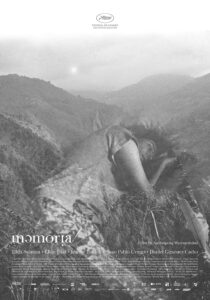Written and Directed by Apichatpong Weerasethakul | 136 min
It’s been more than a decade since I’ve seen a film by the revered Thai filmmaker with the challenging-to-pronounce name. It was his Palme d’Or-winning Uncle Boonmee Who Can Recall His Past Lives, a picture that is delightfully resistant to the tyranny of traditional narrative. His work is an experience unlike much else I’ve seen. It’s possible I might’ve needed a good 10 years to properly recover from and prepare for one.
This new one stars Tilda Swinton, which prompts suggestion on Film Twitter that casting such a prominent Western actor would bring a more conventional approach, and certainly Weerasethakul’s first film in English. That foolish notion should’ve been discounted as soon as you consider Swinton’s career. She’s acted in Russian and Italian, and most of Memoria, set in Colombia, is in Spanish, of which she seems to have a conversational grasp. I don’t think this is a step away from what I understand to be Weerasethakul’s style.
She’s Jessica, who works with flowers — it’s a little unclear what her profession actually is, but she seems to cultivate and does research into plants. One night she awakes to a sudden, loud noise. She describes it as a concrete ball falling into a metal container, surrounded by water. I heard it like a basketball thrown hard against a gym wall. Bang!
Nearby, a bunch of car alarms all go off at once, only to shut off. one at a time. Jessica keeps hearing the sound, so connects with a music engineer, Hernán (Juan Pablo Urrego) who is able to reproduce the sound in studio. Why this is helpful isn’t entirely clear. Hernán, who is quite a bit younger than Jessica, seems romantically interested in her. But, nothing is actually as it seems here, and Jessica starts to suspect she’s losing her mind.
While these plot details suggest a more linear experience than some of his other films, we get plenty other subplots involving an archeologist removing human remains from a tunnelling project and Jessica’s sister in the hospital. Maybe all the plot elements are subplots. This is an exercise in attention. Memoria challenges you to find and maintain its pace, subscribe to its periodic lessons in meditation.
Weerasethakul explores our relationship to nature, our relationship to community memory in his deliberate manner. Scenes move extraordinarily slowly, sometimes into real time, connected by only the slenderest, most essential, threads: character, emotion, life, death, animals, and plants. There’s something fundamental about what he’s trying to say about life with this film — it may be demanding to anyone in the audience who is unprepared, but it’s also strangely wondrous with room for genuine, though unthreatening, supernatural and scifi notes.
Wide swaths of the film I didn’t really understand, and I’m fine with that. In fact, I can’t remember the last time I’ve seen a feature where I was so OK with being completely lost. (I’d say maybe Uncle Boonmee, but I found it, in places, more frustrating for its opacity.) There were even times in Memoria where I drifted away, lost in thought about things other than the film, and had to bring back my attention to what was happening on screen. And I think that’s fine. That’s part of the exercise of mindfulness, isn’t it?
Later in the running, Jessica meets an older man also named Hernán (Elkin Díaz). Jessica and Hernán genuinely connect in a series of moments that insist on the audience being entirely present, as if everything that came before was just prologue. The metaphysical here feels just within our grasp. It may even be mundane. Memoria is going to stay with me for a long while.











